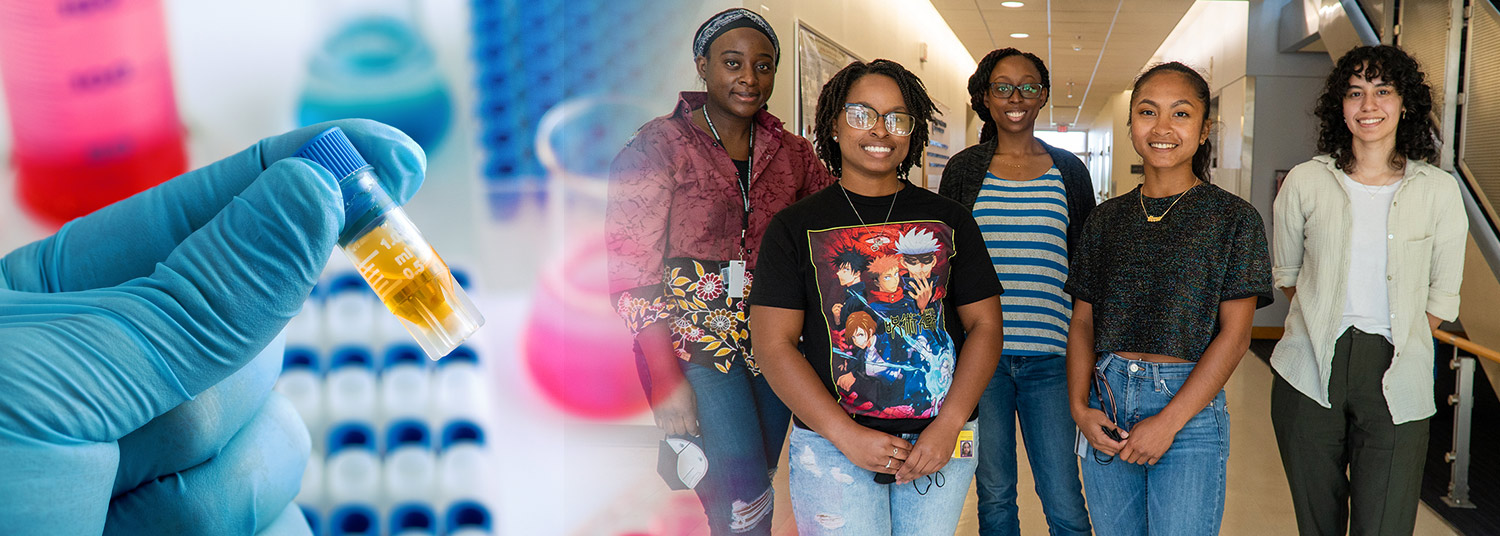
News 2023 – University of Maryland SOP, SOM receives $1.1 million grant to increase biomedical workforce diversity
The collaboration will help recruit, train and mentor students from underrepresented groups.
 The National Institutes of Health (NIH) awarded a $1.1 million grant to the University of Maryland Schools of Pharmacy (UMSOP) and Medicine (UMSOM) to create a training program to improve the diversity of the biomedical workforce.
The National Institutes of Health (NIH) awarded a $1.1 million grant to the University of Maryland Schools of Pharmacy (UMSOP) and Medicine (UMSOM) to create a training program to improve the diversity of the biomedical workforce.
The quinquennium Initiative to Maximize Student Development (IMSD) program strives to increase the number of students from underrepresented groups in UMSOP doctoral programs Department of Pharmaceutical Sciences (PSC) and UMSOM Graduate Program in Life Sciences (GPILS).
“This grant is a significant milestone and a testament to the success of the entire PSC graduate program over the past five years in recruiting and mentoring underrepresented students,” said Peter Swaan, PhD, Chair of the Department of Pharmaceutical Sciences, Associate Dean for Research and Advanced Graduate Studies, and Emeritus University Professor at UMSOP. “We look forward to working with our colleagues in the School of Medicine to build a diverse and competitive biomedical workforce through IMSD.”
Increase diversity
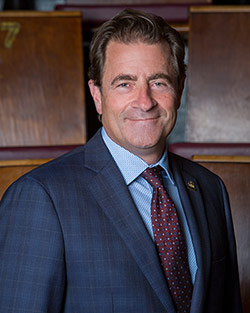 The goal of the IMSD program is to train a diverse pool of doctoral students across the spectrum of biomedical research, which is why the SOP and SOM jointly host this program. Students will apply for admission to graduate programs in PSC or GPILS. A team of professors from both schools will then select students for the IMSD training program, which will take 10 students per year, five in PSC and five in GPILS. The first batch of students started in August.
The goal of the IMSD program is to train a diverse pool of doctoral students across the spectrum of biomedical research, which is why the SOP and SOM jointly host this program. Students will apply for admission to graduate programs in PSC or GPILS. A team of professors from both schools will then select students for the IMSD training program, which will take 10 students per year, five in PSC and five in GPILS. The first batch of students started in August.
“This scholarship program provides us with the opportunity to create a higher education experience that is uniquely tailored to the needs of our students, in which they know their opinions are respected, their identities and cultural connections are valued, and their intellectual curiosities are fed, said Mark T. Gladwin, MDVice President of Medical Affairs at the University of Maryland, Baltimore (UMB), and John Z. and Akiko K. Bowers Professor Emeritus and Dean of UMSOM. “Cultivating this kind of inclusive academic environment is one of our top strategic priorities.
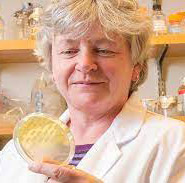 Angela Wilks, PhD, the Isaac E. Emerson Chair of Pharmaceutical Sciences at the SOP and one of four principal investigators (PIs) on the grant, added: “This award is not only an opportunity to increase the platform for underrepresented minorities on campus, but it is also a chance to expose all of our students to a diverse environment, We want to prepare our students to work in environments where diversity, equity and inclusion are hallmarks of everything they do.
Angela Wilks, PhD, the Isaac E. Emerson Chair of Pharmaceutical Sciences at the SOP and one of four principal investigators (PIs) on the grant, added: “This award is not only an opportunity to increase the platform for underrepresented minorities on campus, but it is also a chance to expose all of our students to a diverse environment, We want to prepare our students to work in environments where diversity, equity and inclusion are hallmarks of everything they do.
 Mandy Oglesby, PhDassociate professor of PSC at UMSOP and PI of the grant, said she wants to help build a biomedical workforce that is more like her community and the country.
Mandy Oglesby, PhDassociate professor of PSC at UMSOP and PI of the grant, said she wants to help build a biomedical workforce that is more like her community and the country.
“Diversity is extremely important to the success of every industry,” said Dr. Oglesby. “When you have a diverse group of people working on a solution to a problem, you have more creativity and more representation in public health perceptions.”
Recruitment and retention
Lisa Jones, PhDa former UMSOP faculty member who helped write the NIH proposal said recruitment and retention are two major factors when it comes to diversification in biomedicine.
“Some students think they can’t be scientists because of a lack of role models who look like them.” said Dr. Jones. “Our goal with IMSD is to provide students with programming and mentorship to help them deal with issues unique to underrepresented populations.”
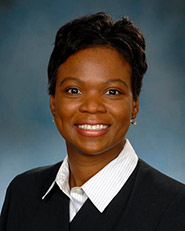 The IMSD grant aims to provide funding to fill recruitment and retention gaps. It will cover first-year stipends for graduate students accepted into the program, conference travel, social events, and programming.
The IMSD grant aims to provide funding to fill recruitment and retention gaps. It will cover first-year stipends for graduate students accepted into the program, conference travel, social events, and programming.
The grant is also led by IPs Dudley K. Strickland, PhDAssociate Dean for Graduate and Postdoctoral Studies and Professor of Surgery at UMSOM, and Tonya J. Webb, PhDDeputy Director for Diversity, Equity and Inclusion and Associate Professor of Microbiology and Immunology at UMSOM.
“This grant program aligns directly with our mission to improve the human condition and serve our community, which highlights our strengths as a leading research, teaching and healthcare institution,” says Dr. Webb. “For me, being part of the journey of our students is incredible. It’s a chance to be a part of something big by helping to create this protected space for the next generation of budding scientists to flourish, which is incredibly rewarding. I am grateful.”
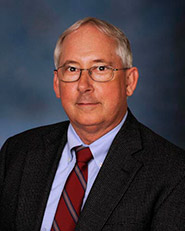 Dr. Strickland said, “Awarding this grant to UMB will allow us to continue to recruit and support the best and brightest students in the country with the goal of providing a science education that will enhance and increase diversity in all fields of science. “
Dr. Strickland said, “Awarding this grant to UMB will allow us to continue to recruit and support the best and brightest students in the country with the goal of providing a science education that will enhance and increase diversity in all fields of science. “
SOP and SOM are working together to develop the content of the program, which will be aimed at IMSD students, including workshops on topics as varied as scientific writing to deal with microaggressions in the different career paths in STEM fields. The grant is further supported by the program administrators in each school – Kristina San Juan in the POS and Sharron Graves, DBA, in som.
The IMSD program emulates and derives from the University of Maryland, Baltimore County Meyerhoff Graduate Scholarship Program, a multi-year IMSD partnership with UMB. Other institutions implementing the NIH IMSD program include the University of North Carolina at Chapel Hill, Emory University, and the University of Arizona.
About University of Maryland Medical School
Now in its third century, the University of Maryland Medical School was incorporated in 1807 as the first public medical school in the United States. It continues today to be one of the world’s fastest growing leading biomedical research enterprises – with 46 academic departments, centers, institutes and programs, and a faculty of more than 3,000 physicians, scientists and allied health professionals, including members of the National Academy of Medicine and the National Academy of Sciences, and a two-time distinguished recipient of the Albert E. Lasker Award in Medical Research. With an operating budget of more than $1.3 billion, the School of Medicine works closely with the University of Maryland Medical Center and Medical System to provide intensive research, academic, and clinical care to nearly 2 million patients each year. The School of Medicine has nearly $600 million in extramural funding, with most of its academic departments ranking highly among all medical schools in the nation for research funding. As one of seven professional schools that make up the University of Maryland, Baltimore campus, the School of Medicine has a total population of nearly 9,000 faculty and staff, including 2,500 students, trainees, residents and fellows. The combined medical school and medical system (“University of Maryland Medicine”) has an annual budget of more than $6 billion and an economic impact of nearly $20 billion on the state and local community. The School of Medicine, which ranks first 8th highest among public medical schools in research productivity (according to the Association of American Medical Colleges profile) is an innovator in translational medicine, with 606 active patents and 52 start-up companies. In the latest US News & World Report ranking of the best medical schools, published in 2021, UM School of Medicine is ranked #9 among 92 public medical schools in the United States and in the richest 15% (#27) of all 192 public and private American medical schools. The School of Medicine works locally, nationally and globally, with research and treatment facilities in 36 countries around the world. Visit medschool.umaryland.edu
About University of Maryland School of Pharmacy
Founded in 1841, the University of Maryland School of Pharmacy is ranked 14th out of more than 140 schools of pharmacy by US News and World Report. The school is a thriving center for professional and higher education, pharmaceutical care, research, and community service. Its faculty is creating the future of pharmacy by creating new roles for pharmacists in advanced clinical practice and conducting cutting-edge research in drug discovery and development, comparative effectiveness, and patient-centered outcomes, and disease management. A contemporary curriculum, innovative educational experiences, and strategic professional relationships help inspire excellence in the School’s more than 1,200 students, residents, and postdoctoral fellows. The school offers 10 academic programs: Doctor of Pharmacy; Doctoral programs in palliative care, pharmaceutical health services research and pharmaceutical sciences; and master’s programs in medical cannabis science and therapeutics, palliative care, pharmaceutical health services research, pharmaceutical sciences, pharmacometrics, and regulatory sciences. With a research portfolio of over $32 million in grants and contracts, the School is ranked 16th by the American Association of Colleges of Pharmacy among schools of pharmacy. In 2017, the School launched its proprietary Pharmapreneurship™ program, which outlines the School’s commitment to supporting and best positioning faculty and students to achieve their career aspirations and meet our nation’s health challenges. Health care.

Comments are closed.